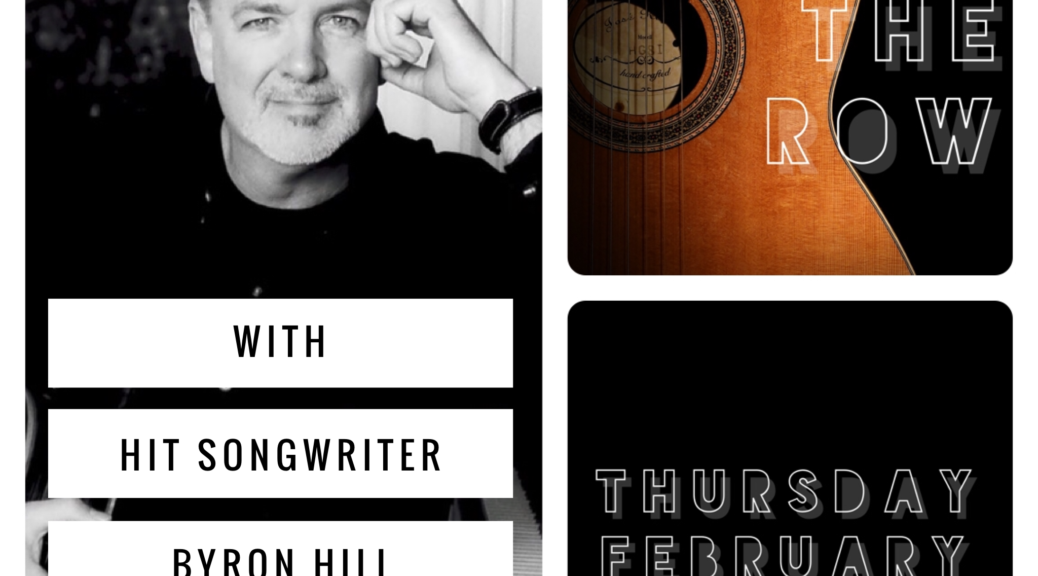Here’s golden advice from a Hall of Fame songwriter.
Byron Hill is a multi-hit songwriter and producer whose songs have generated more than 700 recordings and have been released on 91 industry certified Gold and Platinum albums and singles. They have earned 10 ASCAP Awards, 34 US and Canadian top-10 chart hits and have become hits in many other worldwide markets.
In 2018, Byron was inducted into the Nashville Songwriters Hall of Fame. His many hits include George Strait’s first #1, “Fool Hearted Memory,” Alabama’s “Born Country,” and Gary Allen’s “Nothin’ On But The Radio.”
Byron was a recent guest on Frettie.com’s “Know The Row,” and he shared some great, real-world advice for songwriters. Here’s some of what he had to say.
Read on!
________________________________
To BE a pro, you need to THINK like a pro, and this FREE ebook will help transform your thinking, your songwriting, and your success. Get it today!
_________________________________
Here is a bit of Byron’s advice (paraphrased):
I try to eliminate the “flaw factors” right from the beginning of writing a song, such as deciding on uptempo-or-ballad or male-or-female-or-either or positive-or-negative. You have this precious moment at the beginning where you get to decide these things.
It’s best to spend your time trying to write something iconic verses something novelty or divisive (such as current political topics).
In the late 70’s or 80’s, you could write a song where the singer is a down-and-out character. These days, it’s smart to write that song where the singer is singing ABOUT that down-and-out character, instead of the singer BEING that character.
If you’re writing an idea that is too painful or personal, writing it in the 3rd person can make it more accessible for more artists.
To stay relevant over time, try to find current stuff you like. Do a lot of listening. If you give up on it, that’s going to hurt you. Don’t give up on a genre if you don’t like what’s in the top 20.
If you feel like your chosen market has abandoned you, look around for other markets – some places where something excites you. Stay flexible and engaged.
The music business is less song-driven and is more relationship-driven that I’ve ever seen it. The song is still very important, but the relationship with the artist, producer, etc. is more important than ever. Find the up-and-coming artists and producers.
Learn the craft of songwriting first. Then you can start focusing on the relationships / business-side of songwriting.
There are so many new artists. Consider who would be the best investment of your time. Do they have the drive? Do you write well with them? Then go with your gut.
I’ve had my songs torn up in front of me. I’ve been told to go home. Between deals, I’ve been told things that make you want to go home and quit. Rejection is part of the business. You just have to keep going and not worry about it.
As a professional, I don’t worry about rejection. I just keep working my songs until something positive happens.
If you’d like to hear EVERYTHING Byron had to share, the full video replay is available in Frettie’s Member Area. It’s right there along with full video replays of other events with hit songwriters, Chris Lindsey & Jimmy Yeary, music publisher Scot Sherrod, artist/writer Aaron Goodvin, and more.
If you want to join our next event live, “Know The Row” is a cool opportunity for us to hang out together (online) with a music industry pro. It starts off with a brief conversation between me and our guest, as he or she reveals information YOU need to know about the music biz. After that, we’ll open it up to YOUR questions.
Next month, our guest is hit music publisher MATT LINDSEY! Matt has published a ton of hit writers, and he has gotten songs recorded by Garth Brooks, George Strait, Blake Shelton, Kenny Chesney, Willie Nelson, George Jones, and more.
This is something you do NOT want to miss!
This event will be on Tuesday, February 5, 7:30pm-8:30pm Central.
Can’t make it to the live event? Every “Know The Row” is recorded and added to the Frettie Members Area. These videos are a resource for Frettie subscribers.
CLICK HERE TO GET ALL THE INFO.

God Bless and Enjoy the Journey,
Brent
Brent Baxter is a hit songwriter with cuts by Alan Jackson, Randy Travis, Lady Antebellum, Joe Nichols, Gord Bamford, Ruthie Collins, Ray Stevens and more. He’s written a top 5 hit in the US, a #1 in Canada, and a top 10 in Texas. His songs appear on 5 industry-certified gold & platinum albums & singles… so far. He also hosts a top-rated songwriting and music business podcast called, “The C.L.I.M.B.” which can be found on iTunes or your favorite podcast app.

















